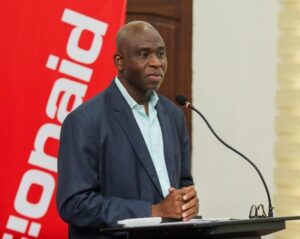By Deborah Asantewaah SARFO
Vice-Chancellor of the University for Development Studies (UDS), Professor Seidu Al-hassan, has underscored the achievement of food sovereignty as a significant step toward strengthening the country’s ability to pay its debt.
According to him, in ensuring food security in the country, the basics of agriculture – which includes processing, packaging and storage – must be fixed to increase food production, facilitate food availability to citizens, and create excesses which would be exported to generate more income for paying debts.
In his opening remarks at ActionAid Ghana’s (AAG) National Climate Change Seminar under the theme ‘Shifting the finance from funding fossil fuels and industrial agriculture to promoting food sovereignty through agroecology and indigenous seed development’, he indicated that with arable lands scattered across most of the regions, the country possessed a huge potential in the area of agriculture; hence, they must prioritised food.
He, therefore, concluded: “It would be difficult for even Ghana to service its debt unless food sovereignty is attained.

“I think that to increase the nation’s ability to service its debt. We must first of all, fix the fundamentals of agriculture – how we can increase food production, how we can increase food storage, and then even improve upon food processing and packaging.
“When we can deal with the food problems and know we have enough to eat, whatever is left – if we are paying and servicing our debts – will be a less problem.”
Finance Minister Dr. Mohammed Amin Adam, presenting the mid-year budget review, disclosed that the country’s public debt stood at GH¢742billion (US$50.9billion) equivalent to 70.6 percent of GDP.
He noted that the figure indicates an increase of 22 percent due to the effect of the cedi depreciation and the continuous disbursements from creditors.
According to Mr. Adam, “the stock consists of external debt of GH¢452billion and domestic debt of GH¢290billion, representing 60.9 percent and 39.1 percent of the total debt stock, respectively”. While external debt represented 43 percent of GDP, domestic debt represented 27.6 percent.
Focusing on the drought in the Northern Region, Prof. Al-hassan urged policy-makers, together with researchers, to be proactive to ensure such a disaster in the agricultural sector does not happen.
He further highlighted the implications of the drought to farmers, emphasising the psychological impact and how farmers will be discouraged from investing in agriculture in the offing,
“It can even serve as a disincentive for farmers to invest money, energy and time into agriculture. For me, what is worrying is not the physical loss but the psychological impact on the farmers. Farmers are currently traumatised and discouraged, they do not have hope,” he said.
For his part, the Country Director of AAG, Mr. John Nkaw, mentioned that a report from their outfit reveals that climate-wrecking sectors (fossil fuel and industrial agriculture) are benefitting from subsidies amounting to an average of US$677billion in the Global South every year.
To salvage the situation, he called on institutions to redirect fund flows from climate-destructive corporations into agricultural production to ensure food security.
Additionally, he called on the government to “invest in a just transition focusing on investment into renewable energy transition and sustainable agriculture”. This approach, he believes, will create more employment in the agricultural value chain and address the SDGs.
“ActionAid is calling for the redirection of fund flows from the corporates into agricultural production. We are also calling on the government to invest in a just transition to see a lot of investment into renewable energy transition and sustainable agriculture. This will help in addressing the sustainable development goals across the world,” he said.










